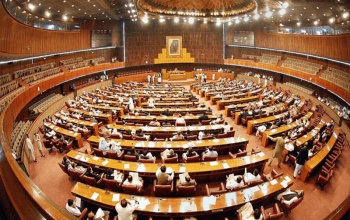Despite his imminent elevation to the Supreme Court, Lahore High Court (LHC) Chief Justice Malik Shahzad Ahmad Khan continues to give tough time to the executive by taking action against alleged interference of agencies in judicial functions as well as adjudication of election disputes.
Last week, the Judicial Commission of Pakistan (JCP) nominated Khan as an SC judge by a majority vote. Four of the nine JCP members had objected to his nomination on the ground that in order to restore public confidence in the judiciary in Punjab, there was a need to have a strong administrative head.
However, Chief Justice of Pakistan Qazi Faez Isa, representatives of the government—Attorney General for Pakistan Mansoor Awan and Law Minister Azam Nazeer Tarar—and representative of Pakistan Bar Council (PBC) Akhtar Hussain had joined hands and endorsed the LHC CJ’s elevation to the SC.
The executive authorities were apparently upset on account of Justice Khan’s decisions regarding the appointment of Anti-Terrorism Courts (ATCs) judges, nomination of judges for election tribunals and allocation of political cases.
LHC Chief Justice Malik Shahzad Ahmad Khan has now started contempt proceedings on the basis of the reports shared with the LHC registrar by Sargodha ATC Judge Muhammad Abbas. The ATC judge had accused some officials of the Inter-Services Intelligence (ISI) of harassing and threatening him.
The LHC has issued notices to all respondents including the ISI Sargodha sector commander to submit reports through Additional Attorney General as well as Punjab Advocate General today (Thursday).
Justice Khan in his order noted that Sargodha ATC Judge Muhammad Abbas enjoys a very good reputation and is an honest and hardworking judicial officer of this institution.
“The abovementioned judicial officer has levelled very serious allegations in his above-referred reports regarding the threats and harassment given to the said judicial officer and his family and causing restraint in his judicial work,” he noted.
The ATC judge’s reports endorsed the claim made in a letter written by six Islamabad High Court (IHC) judges on March 25 about interference of agencies in judicial functions.
Later, different other high courts—especially the LHC and the Peshawar High Court (PHC) admitted that interference of the executive in judicial functions was an “open secret”.
A seven-member larger bench led by CJ Isa is conducting suo motu proceedings based on the IHC judges letter. The matter has not yet been scheduled for hearing this month.
During the hearing so far, CJ Isa has remained careful and not endorsed the IHC judges’ claim. In one of the hearings, he had even wondered why the high court [IHC] did not issue contempt notices after alleged incidents of interference.
Now the LHC chief justice has taken notice of alleged interference of agencies in judicial functions.
This contempt proceeding may create difficulties for CJ Isa who supported the government and bar representatives’ stance about elevation of Justice Kham to the SC despite opposition by three senior most SC judges. It will be interesting to see how CJ Isa will play his role to make the judiciary strong.
Commenting on LHC contempt proceedings, Abdul Moiz Jafferii Advocate said it is absolutely necessary for the judiciary to stand behind its most vulnerable members, “who are on the judicial frontlines”.
“For too long our superior court judges have taken shelter in comfort whilst extolling the virtues of proper conduct to judges of the lower judiciary who have to make extremely difficult decisions on a daily basis and find themselves left alone and vulnerable when they face pressure.”
Jafferii said this is a welcome start but it should become the norm rather than one courageous act.
However, Saiful Malook Advocate said all institutions should stay within their limits.
“Reports of the learned ATC judge didn’t demand such an extreme action by the worthy chief justice. Such extreme judicial actions can bring betterment rather they would deteriorate the matters further.”
He said the executive and judicial branches which are two departments of state should not behave as enemy countries and show restraint for betterment of the system.
Although lawyers are annoyed with the LHC chief justice, Lahore High Court Bar Association is likely to support Justice Khan’s decision to initiate contempt proceedings on the basis of the ATC judge’s reports.
Now it will be a test for the incoming LHC chief justice as to how he maintains the incumbent chief justice’s legacy. The LHC has also constituted more election tribunals to adjudicate election petitions.
The Election Commission of Pakistan (ECP) may approach the Supreme Court against the election tribunals. It will be interesting to see whether the SC backs the LHC actions or endorses the ECP stance as it did on January 13 by upholding the ECP’s decision to deprive the PTI of its election symbol.
Read the full story at the express tribune website.

